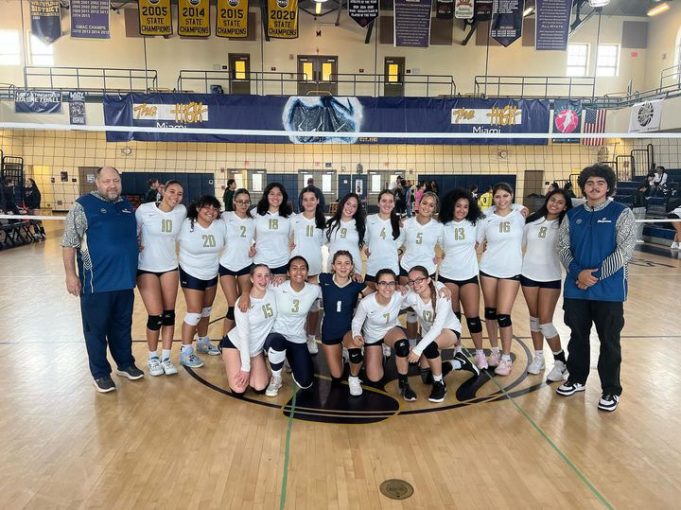Unemployment vs. USA

March 3, 2021
Back in March of 2020, students from across the country left their classrooms and went into quarantine. Following their footsteps into prevention of the COVID-19 virus, many of their parents left the workplace to stay at home. Unfortunately, many of them found themselves unemployed or with shortened hours and salary after a couple of weeks of absence from their jobs.
Miami Senior High graduate and college freshman, Raul Perez, described how during the unemployment period, his family struggled to pay the bills and rent due to the lack of income from his parents and even himself. He also said that after his parents had gone back to work, their hours and salary had been cut short by almost half of their regular schedules and pay, adding on to the financial struggle. Raul stated, “2020 has been, financially, the hardest year for the people of the world.”

Rey Luis Escalona, senior at Miami Jackson High School, confessed how even though he hadn’t gone through a bad time himself since he didn’t work, his cousin had struggled for months. He talks about his small painting business and how after the pandemic started, it was harder for his cousin to get clients “because no one wanted to take a risk for a painting job.” He adds that even though the business was slow since most people were financially struggling and trying to prevent the spread of coronavirus, his cousin could pay his own bills such as rent, electricity, groceries, etc.; yet he had to use money from his savings account, and although that money was saved for emergencies like this one or any other, it still left him shorter in money for him to sustain himself and those with whom he lived.

Senior Jael Verdera gave the point of view from a student whose parents could afford their living, but still had some struggles along the way. She said that even though her dad hadn’t been fired, his paycheck and working hours had gone down by 20% of what he was usually getting. As for her mom, because she works at two schools, she was sent home. One of the schools provided her with a paycheck while she was out of the job; however, the other school didn’t, which led her to look for another job. Even though her parents were able to keep their main jobs, they struggled to pay bills and rent with only their paychecks, and that’s why they – much like Rey L. Escalona’s cousin – had to use money from their savings account, counting also with the generous flexibility of their landlord. Jael added that this year had been “mentally the hardest time” not only for her, but for many others.
However, senior Michel Burgueño of Ohio High Point High School said that because he and his family lived in a “mostly industrialized” state, his family didn’t have such a bad time as others during the unemployment period. He added that because he and other two of his family members worked at the Honda company, they were only sent home for two weeks, and when they came back, they had the same jobs back and didn’t have to complain about their old schedules or salaries.
Similar to Michel Burgueño, Miami Senior High junior Alexandra Villagra stated that even though her mom had been sent home without a paycheck, Alexandra herself and her stepdad worked the whole time and were able to pay for bills and stay on top of things. She also added that her mom applied for the government unemployment financial aid, and got it for around seven months, which also helped their economic situation since they could afford rent without touching their savings account.
 Nonetheless, the struggle for some continued even after months of searching for a solution. Miami High senior Jose Valladares points to his brother Heimard had to leave his job in a small shop due to its closing, and has since then been, “looking tirelessly for a job” to pay the house’s bills. He lives with two sisters and his mom, and even though he hasn’t found a job yet, he has been able to pay his part of the bills and rent on time to help his family.
Nonetheless, the struggle for some continued even after months of searching for a solution. Miami High senior Jose Valladares points to his brother Heimard had to leave his job in a small shop due to its closing, and has since then been, “looking tirelessly for a job” to pay the house’s bills. He lives with two sisters and his mom, and even though he hasn’t found a job yet, he has been able to pay his part of the bills and rent on time to help his family.
Miami High junior Julian Del Campo also shared his experience when looking for a job during this unemployment period. He started working at a restaurant as a dishwasher, and – like most public places – it closed down. Months after it reopened, Julian was called, only to work for about two weeks, and leave the place after being given a repetitive speech of how the restaurant wasn’t running as smoothly, so they needed to lay off some employees. He then looked for another job, and soon enough started working in another restaurant/cafeteria, where he was given the position of chef and all the benefits the previous workplace didn’t offer, including doing the work of just one person instead of two.
“Looking for a new job was pretty stressful since I was 16 when all this was getting serious, so a lot of places I applied for didn’t want minors.”
— Julian Del Campo
College junior Adianez Anias was also affected by such troubling times when finding a job. She said, “I applied for about 30 jobs and only got called for an interview from one of them, and it was an overnight job.” She added that it wouldn’t have worked for her to accept that position because she didn’t have a car at the time and also had school to think about. It was very stressful to apply to so many jobs and not get a call back in months. It was a couple of months ago that she was able to finally get a job position as security guard in a residence.
“I prefer this job because it’s not something that you can just do yourself from home,” Adianez said. “You need to hire people to do it; so – in some ways- it’s a more secure position to have. Even though I have this job now, if you don’t have a pull somewhere to get a job, it’ll be a lot harder to get it even after you applied.”
|
|||||||||||||||||||||||||||||||||||||||||||||||||||||||||||||||||||||||||||||||||||||||||||||||||||||||||||||||||||||||||||||||||||||||||||||||||||||||||||||||||||||||||||||||||||||||||||||||||||||||||||||||||||||||||||||||||||||||||





Katina Quiroga • Mar 5, 2021 at 6:39 am
Good and interesting article by such a young lady. Always a pleasure to read you.
Adi • Mar 3, 2021 at 7:06 pm
Very good article and super accurate as always. Thanks for sharing our stories, these times are indeed difficult and we have to stay together in order to succeed.
Alberto Anias • Mar 3, 2021 at 2:45 pm
Always interesting, Miss Alejandra’s proposals invite us to reflect and meditate on issues that impact the population of all social strata. Courage young lady, journalism awaits you. God take care of her and make her dreams come true